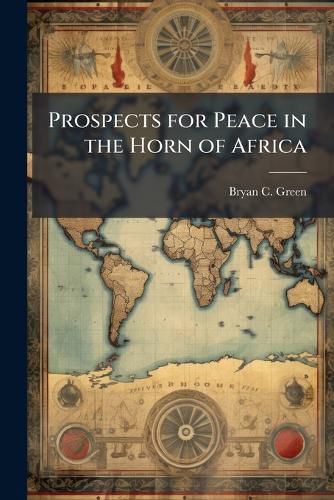Readings Newsletter
Become a Readings Member to make your shopping experience even easier.
Sign in or sign up for free!
You’re not far away from qualifying for FREE standard shipping within Australia
You’ve qualified for FREE standard shipping within Australia
The cart is loading…






The Horn of Africa region is currently engaged in numerous conflicts. The crisis in Darfur and the ongoing conflict in Somalia usually garner the most headlines. The conflict between Ethiopia and Eritrea, however, poses the greatest threat to continued regional instability. The Horn of Africa's strategic location along a primary commercial trading route and its proximity to radical Islamic elements in the Middle East make it a priority for the United States. U.S. policy in the region, however, needs to be broadened, as it is contributing to the current conflict between Ethiopia and Eritrea and its spillover effects into Somalia. The U.S. and the international community have not done enough to help enforce and implement the Algiers Agreement, which officially ended the 1998-2000 border war between Ethiopia and Eritrea. This is unacceptable. Ethiopia has been allowed to blatantly disregard an internationally brokered and binding border ruling, while Eritrea has consistently encouraged, supported, and engaged in destabilizing behaviors in Ethiopia and Somalia. The U.S. has a principal role to play in helping to secure and stabilize the region. It should pressure Ethiopia to accept the border decision without stipulations, and engage Eritrea in positive diplomatic talks to discourage subversive behavior with its neighbors. Additionally, it should work with all the stakeholders to help facilitate a constructive, inclusive, and effective government in Somalia.
This work has been selected by scholars as being culturally important, and is part of the knowledge base of civilization as we know it. This work was reproduced from the original artifact, and remains as true to the original work as possible. Therefore, you will see the original copyright references, library stamps (as most of these works have been housed in our most important libraries around the world), and other notations in the work.
This work is in the public domain in the United States of America, and possibly other nations. Within the United States, you may freely copy and distribute this work, as no entity (individual or corporate) has a copyright on the body of the work.
As a reproduction of a historical artifact, this work may contain missing or blurred pages, poor pictures, errant marks, etc. Scholars believe, and we concur, that this work is important enough to be preserved, reproduced, and made generally available to the public. We appreciate your support of the preservation process, and thank you for being an important part of keeping this knowledge alive and relevant.
$9.00 standard shipping within Australia
FREE standard shipping within Australia for orders over $100.00
Express & International shipping calculated at checkout
The Horn of Africa region is currently engaged in numerous conflicts. The crisis in Darfur and the ongoing conflict in Somalia usually garner the most headlines. The conflict between Ethiopia and Eritrea, however, poses the greatest threat to continued regional instability. The Horn of Africa's strategic location along a primary commercial trading route and its proximity to radical Islamic elements in the Middle East make it a priority for the United States. U.S. policy in the region, however, needs to be broadened, as it is contributing to the current conflict between Ethiopia and Eritrea and its spillover effects into Somalia. The U.S. and the international community have not done enough to help enforce and implement the Algiers Agreement, which officially ended the 1998-2000 border war between Ethiopia and Eritrea. This is unacceptable. Ethiopia has been allowed to blatantly disregard an internationally brokered and binding border ruling, while Eritrea has consistently encouraged, supported, and engaged in destabilizing behaviors in Ethiopia and Somalia. The U.S. has a principal role to play in helping to secure and stabilize the region. It should pressure Ethiopia to accept the border decision without stipulations, and engage Eritrea in positive diplomatic talks to discourage subversive behavior with its neighbors. Additionally, it should work with all the stakeholders to help facilitate a constructive, inclusive, and effective government in Somalia.
This work has been selected by scholars as being culturally important, and is part of the knowledge base of civilization as we know it. This work was reproduced from the original artifact, and remains as true to the original work as possible. Therefore, you will see the original copyright references, library stamps (as most of these works have been housed in our most important libraries around the world), and other notations in the work.
This work is in the public domain in the United States of America, and possibly other nations. Within the United States, you may freely copy and distribute this work, as no entity (individual or corporate) has a copyright on the body of the work.
As a reproduction of a historical artifact, this work may contain missing or blurred pages, poor pictures, errant marks, etc. Scholars believe, and we concur, that this work is important enough to be preserved, reproduced, and made generally available to the public. We appreciate your support of the preservation process, and thank you for being an important part of keeping this knowledge alive and relevant.